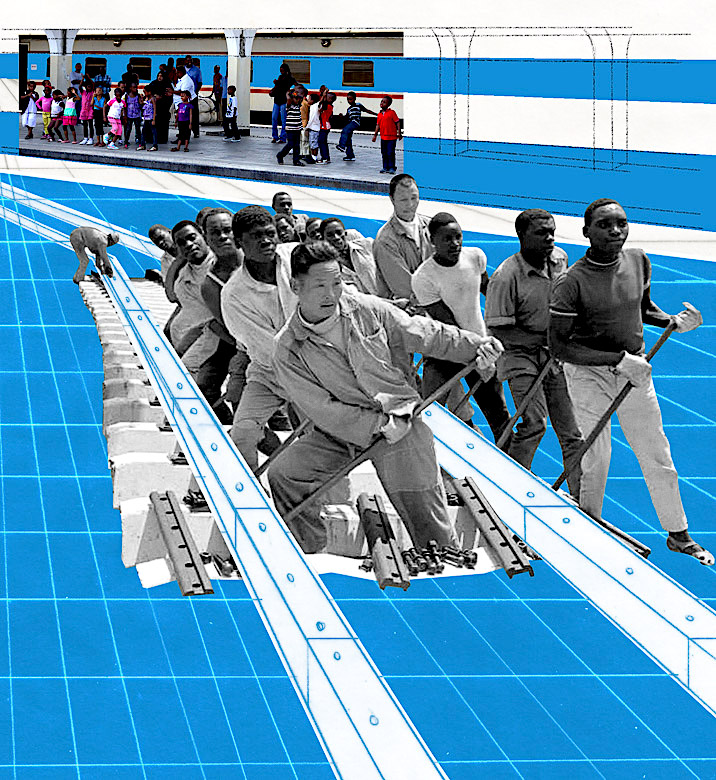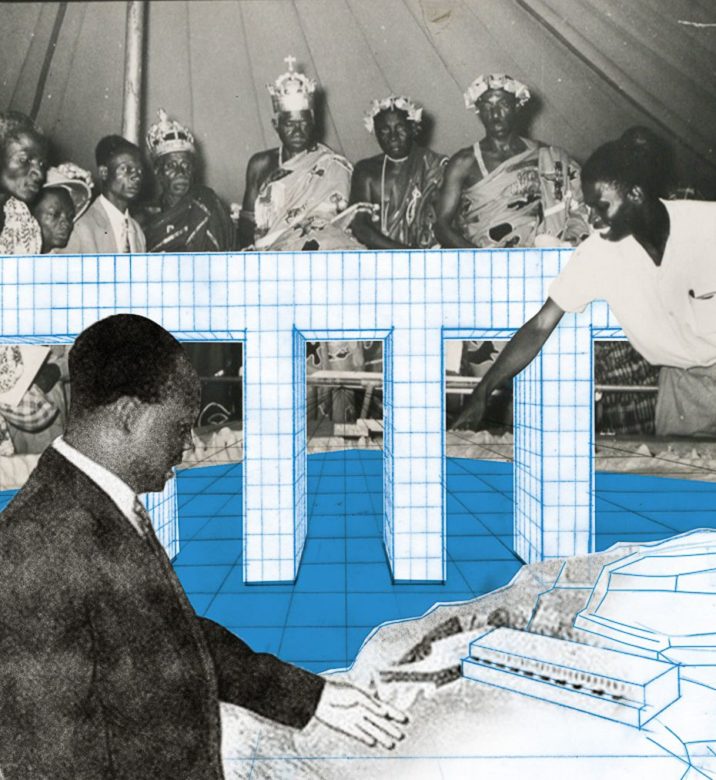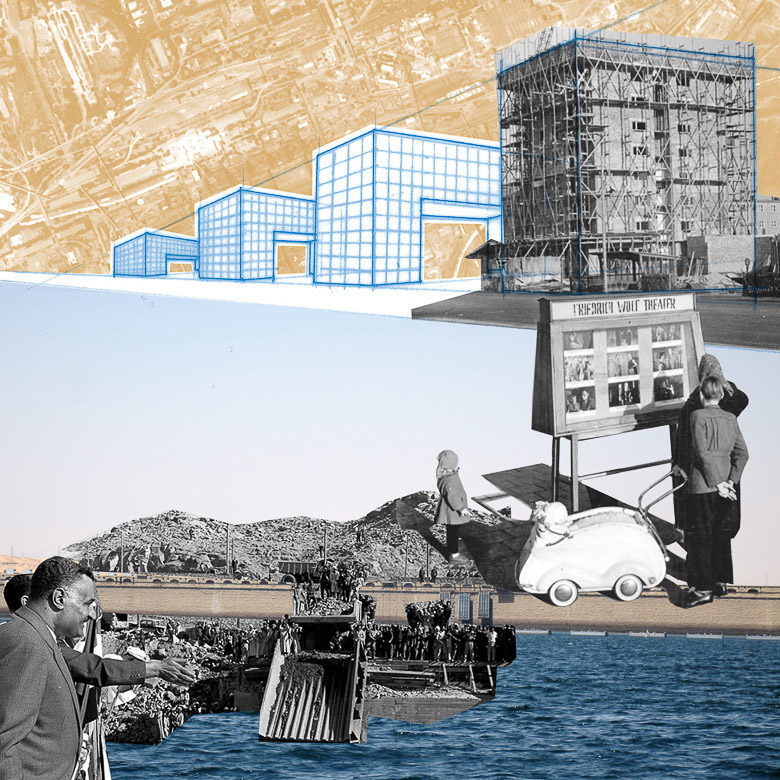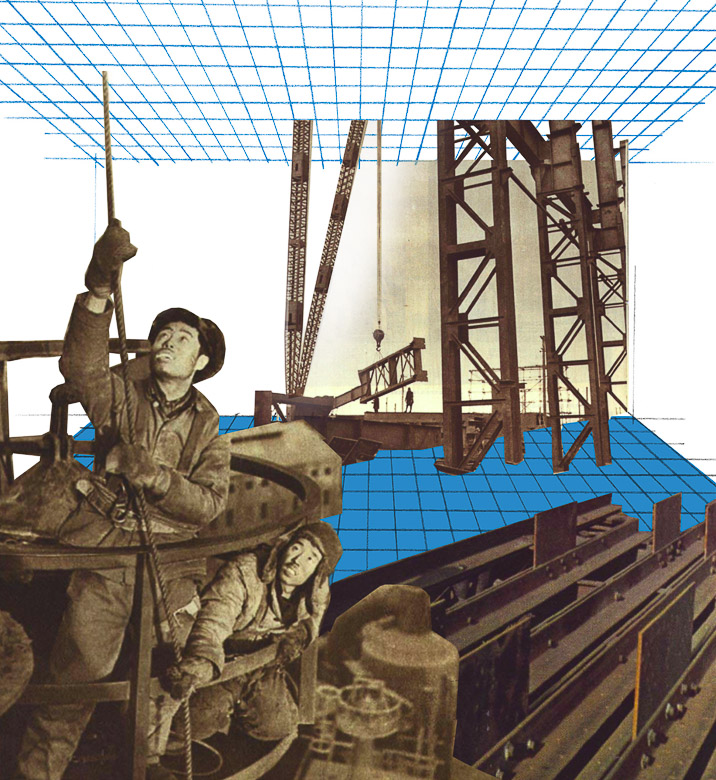No effective general theoretical orientation has been provided to guide realistic and holistic development agendas, writes Vijay Prashad. And no outlines seem readily available for an exit from the permanent debt-austerity cycle.

The TAZARA Railway, or Uhuru Railway, connecting the East African countries of Tanzania and Zambia, was funded by China, constructed by Chinese and African workers and completed in 1975. (Collage by Tricontinental: Institute for Social Research based on reference images by David Brossard via Wikimedia Commons, CC BY-SA 2.0 and unknown source via The Zambian Observer)
.
By Vijay Prashad
Tricontinental: Institute for Social Research
 In June, the United Nations’ Sustainable Development Solutions Network published its “Sustainable Development Report 2023,” which tracks the progress of the 193 member states towards attaining the 17 Sustainable Development Goals, or SDGs.
In June, the United Nations’ Sustainable Development Solutions Network published its “Sustainable Development Report 2023,” which tracks the progress of the 193 member states towards attaining the 17 Sustainable Development Goals, or SDGs.
“From 2015 to 2019,” the network wrote, “the world made some progress on the SDGs, although this was already vastly insufficient to achieve the goals. Since the outbreak of the pandemic in 2020 and other simultaneous crises, SDG progress has stalled globally.”
This development agenda was adopted in 2015, with targets intended to be met by 2030. However, as the deadline looms, the report noted that “all of the SDGs are seriously off track.”
Why are the U.N. member states unable to meet their SDG commitments? “At their core,” the network said, “the SDGs are an investment agenda: it is critical that U.N. member states adopt and implement the SDG stimulus and support a comprehensive reform of the global financial architecture.”
Yet, few states have met their financial obligations. Indeed, to realise the SDG agenda, the poorer nations would require at least an additional $4 trillion in investment per year.
[Related: How to Eradicate Poverty]
No development is possible these days, as most of the poorer nations are in the grip of a permanent debt crisis. That is why the “Sustainable Development Report 2023” calls for a revision of the credit rating system, which paralyses the ability of countries to borrow money (and when they are able to borrow, it is at rates significantly higher than those given to richer countries).
Furthermore, the report calls on the banking system to revise liquidity structures for poorer countries, “especially regarding sovereign debt, to forestall self-fulfilling banking and balance-of-payments crises.”
[Related: The IMF’s ‘Austerity Drive’]
It is essential to place the sovereign debt crisis at the top of discussions on development. The U.N. Conference on Trade and Development (UNCTAD) estimates that “the public debt of developing countries, excluding China, reached $11.5 trillion in 2021.”
That same year, developing countries paid $400 billion to service their debt — more than twice the amount of official development aid they received. Most countries are not borrowing money to invest in their populations, but to pay off the bondholders, which is why we consider this not financing for development but financing for debt-servicing.

The Akosombo Dam in the Volta River, inaugurated in 1965 during Kwame Nkrumah’s presidency. (Tricontinental collage based on reference images by The National Archives UK via Wikimedia Commons, OGL v1.0 and Unknown source via Pan-African News Wire)
Reading the U.N. and academic literature on development is depressing. The conversation is trapped by the strictures of the intractable and permanent debt crisis. Whether the issue of debt is highlighted or ignored, its existence forecloses the possibility of any genuine advance for the world’s peoples.
Conclusions of reports often end with a moral call — “this is what should happen” — rather than an assessment of the situation based on the facts of the neocolonial structure of the world economy: developing countries, with rich holdings of resources, are unable to earn just prices for their exports, which means that they do not accumulate sufficient wealth to industrialise with their own population’s well-being in mind, nor can they finance the social goods required for their population.
Due to this suffocation from debt, and due to the impoverishment of academic development theory, no effective general theoretical orientation has been provided to guide realistic and holistic development agendas, and no outlines seem readily available for an exit from the permanent debt-austerity cycle.

Collage, from bottom, of the Aswan High Dam in Egypt, the Bhilai Steel Plant in India and the Eisenhüttenstadt high-rise housing project in the German Democratic Republic. (Tricontinental collage based on reference images from Bibliotheca Alexandrina via Wikimedia Commons; Olaf Tausch via Wikimedia Commons, CC BY 3.0; German Federal Archives via Wikimedia Commons, CC BY-SA 3.0 DE; and JSC Gateway to Astronaut Photography of Earth via Wikimedia Commons)
Tricontinental: Institute for Social Research is eager to open a discussion about the need for a new socialist development theory — one that is built from the projects being pursued by peoples’ movements and progressive governments. As part of that discussion is its latest dossier, “The World Needs a New Socialist Development Theory,” which surveys the terrain of development theory from 1945 to the present and offers a few gestures towards a new paradigm. As we note in the dossier:
“Starting with the facts would require an acknowledgement of the problems of debt and deindustrialisation, the reliance upon primary product exports, the reality of transfer pricing and other instruments employed by multinational corporations to squeeze the royalties from the exporting states, the difficulties of implementing new and comprehensive industrial strategies and the need to build the technological, scientific, and bureaucratic capacities of populations in most of the world.
These facts have been hard to overcome by governments in the Global South, although now — with the emergence of the new South-South institutions and China’s global initiatives — these governments have more choices than in decades past and are no longer as dependent on the Western-controlled financial and trade institutions.
These new realities demand the formulation of new development theories, new assessments of the possibilities of and pathways to transcending the obstinate facts of social despair. In other words, what has been put back on the table is the necessity for national planning and regional cooperation as well as the fight to produce a better external environment for finance and trade.”

Anshan Iron and Steel Company was renovated and expanded as one of the 156 construction projects in China that was supported by the Soviet Union in the 1950s. (Tricontinental collage based on reference images from People’s Pictorial via Wikimedia Commons)
A recent conversation in Berlin with our partners at International Research Centre DDR led to the realisation that this dossier failed to engage with the debates and discussions around the development that took place in the Soviet Union, the German Democratic Republic (DDR), Yugoslavia and the broader international communist movement.
As early as the Second Congress of the Communist International, held in Moscow in 1920, communists began to formulate a theory of “non-capitalist development” (NCD) for societies that had been colonised and integrated into the capitalist world economy while still retaining pre-capitalist forms of production and social hierarchy.
The general understanding of NCD was that post-colonial societies could circumvent capitalism and advance through a national-democratic process to socialism. NCD theory, which was developed at international conferences of communist and workers’ parties and elaborated upon by Soviet scholars such as Rostislav A. Ulyanovsky and Sergei Tiulpanov in journals like the World Marxist Review, was centred on three transformations:
- Agrarian reform, to lift the peasantry out of its condition of destitution and to break the power of landlords.
- Nationalisation of key economic sectors, such as industry and trade, to restrict the power of foreign monopolies.
- Democratisation of political structures, education and healthcare to lay the socio-political foundations for socialism.
Unlike the import-substitution industrialisation policy advanced by institutions such as the U.N. Economic Commission for Latin America, NCD theory had a much firmer understanding of the need to democratise society rather than to merely turn around the terms of trade.
The International Research Centre DDR’s “Friendship” series features a powerful recounting of the practical application of NCD theory in Mali during the 1960s in an article written by Matthew Read. The International Research Centre DDR and Tricontinental: Institute for Social Research will be working on a comprehensive study of NCD theory.
Prior to colonialism, African and Arab scholars in West Africa had already begun to work out the elements of a development theory.
For example, ‘Uthman ibn Muhammad ibn ‘Uthman ibn Fodyo (1754–1817), the Fulani sheikh who founded the Sokoto Caliphate (1804–1903), wrote Usul al-‘Adl li-Wullat al-Umur wa-Ahl al-Fadl wa-al-Salatin (The Administration of Justice for Governors, Princes, and the Meritorious Rulers) to guide himself and his followers on a path to lift up his people.
The text is interesting for the principles it outlines, but — given the level of social production at the time — the caliphate relied on a system of low technical productivity and enslaved labour. Before the people of West Africa could wrest power from the caliphate and drive their own society forward, the last caliph was killed by the British, who — along with the Germans and French — seized the land and subordinated its history to that of Europe.
Five decades later, Modibo Keïta, a communist militant, led Mali’s independence movement, seeking to reverse the subordination of African lands through the NCD project. Keïta did not explicitly draw a direct line back to ibn Fodyo — whose influence could be seen across West Africa — but we might imagine the hidden itineraries, the remarkable continuities between those old ideas (despite their saturation in the wretched social hierarchies of their time) and the new ideas that were put forward by Third World intellectuals.
(The artwork in this article pays homage to the developmental aspirations of nations and peoples of the Third World. Largely from the 1950s to 1970s, each project represents a vision of the future built from the ruins of centuries of colonial theft and systematic underdevelopment.
In each collage, we have incorporated historical photographs, overlaid with grids — a kind of architectural canvas on which new constructions for the unfinished project of national liberation can be imagined.)
Vijay Prashad is an Indian historian, editor and journalist. He is a writing fellow and chief correspondent at Globetrotter. He is an editor of LeftWord Books and the director of Tricontinental: Institute for Social Research. He is a senior non-resident fellow at Chongyang Institute for Financial Studies, Renmin University of China. He has written more than 20 books, including The Darker Nations and The Poorer Nations. His latest books are Struggle Makes Us Human: Learning from Movements for Socialism and, with Noam Chomsky, The Withdrawal: Iraq, Libya, Afghanistan and the Fragility of U.S. Power.
This article is from Tricontinental: Institute for Social Research.
The views expressed are solely those of the author and may or may not reflect those of Consortium News.


It says so very much about modern Democrats that they love to focus on getting their own student loan debts forgiven, but don’t say a word about allowing future generations obtain an education without debt. To someone who had just been accepted to college when Reagan and the Reagan Democrats converted the old system of ‘Pell Grants’ to ‘Student Loans’, it seems to be a rather obvious dog that is not barking … the missing call to return to a system of grants and abolish Reaganism and student loans.
It is interesting modern Democrats put their priorities, and it always seems to go back to their current net wealth and their plans to increase it. But they do very much approve of Ronald Reagan. They don’t want to reverse his ‘supply-side’ economics, and the massive federal debts that began in that era with a ‘throw money at the Pentagon’ policy. And they don’t want to reverse his student loan policy. There is no call in the Democrats to go back to pre-Reagan and undo the harm that was done. The Democrats just want their own debts forgiven.
Strange headline, because to my eye and ear, these have been being developed during my entire lifetime.
As to the debt-austerity cycle, that is easy to summarize. Renounce the debt. If some crooked leaders in your country borrowed a bunch of money so they could get rich and party, stand up and proudly declare that this was not your party and you weren’t invited and that this is not your debt and tell the bankers exactly where they can shove it.
The problem with the first question is that the place not to look is at the western corporate dominated UN and their pet trade schools that provide corporate training that are mistakenly known as ‘universities’ and ‘academia’. In a world where every university appears to take corporate money and views education as a corporate tool for better corporate profits, then looking to the academics ain’t gonna find an answer. And the UN is dominated by western governments and western corporations and ain’t gonna anger an oligarch.
I’ve got a touch of grey in my beard, and I feel like I’ve been seeing discussions of these issues my entire lifetime. If you want to search, a suggestion for a starting point would be the word ‘socialism’. Abandon capitalism, and the need to make the rich even richer, and these problems suddenly look a lot easier to solve.
The first step forward is to recognize the world is now more than ever a unitary body and there must be a commitment to global peaceful co-existence and reciprocity by all nations.
Isn’t the term “third world” dated and demeaning? I would also suggest that expecting other countries to reform in a way dictated by others is a bit misguided.
“(The artwork in this article pays homage to the developmental aspirations of nations and peoples of the Third World. Largely from the 1950s to 1970s, each project represents a vision of the future built from the ruins of centuries of colonial theft and systematic underdevelopment.”
And wonderful artwork and collages indeed. I especially relate to the Aswan High Dam collage, as i have stood on that dam many years ago. Now however, Egypt finds itself in dispute over the Grand Ethiopian Renaissance Dam. And the centuries of colonial theft will not be assauged so easily.
Very interesting piece.
While I know of no suggestions that have been proposed in the institutional context that Prashad examines here, there are a few works that provide a basis that could be adapted for such proposals:
* Permaculture: A Design Manual, by Bill Mollison. This provides a basis for regenerative agriculture and industry, and the integration of these within communities. Among many excellent examinations of the matter, this remains the one that encompasses both the scope and the depth of the matter at hand.
* Elinor Ostrom. Ostrom’s extensive empirical research into systems for the management of common pool resources synthesized the principles by which to organize their governance–and common pool resources are all we have, really.
* In practice, management of common pool resources will require management of money, if only because its mismanagement has so extensively subverted and perverted so much human exchange. Allowing non-representative management of currency provides a proven opening for usurpation, so a system of multiple currencies is necessary for the integrity of a federation–the form of government under which large populations have some chance of being governed in representative ways. The works of Bernard Lietaer and Margrit Kennedy are interesting in these regards.
One way for the U.S. itself to develop into a fundamentally moral nation is to forgive student loan debt, provide Medicare-for-All, raise the min wage to a family supporting living wage, strengthen labor unions, implement progressive taxation, and dramatically rollback the Pentagon’s bloody tentacles.
Well, those would be some ways to START developing our country into a fundamentally moral nation, but in the absence of serious magic by Glinda the Good the obvious prerequisite would be to get voters to STOP electing a majority of corrupt representatives who are implacably opposed to such reforms and have decades of experience dividing the electorate into pieces which they have convinced to see such reforms (when compared with wedge-issue reforms they give higher priority to) as contrary to the kind of country they want to live in rather than as conducive to the kind of country that EVERYONE would want to live in.
The vast majority of voters wind up voting for candidates from one of the two dominant political parties in the country, which has gotten us where we are today. Only rarely does a major party candidate manage to break out from the establishment party line and demonstrate the mass appeal across ideological boundaries of more common-sense approaches to governing, but then the party circles their wagons against him or her to keep the sheep in their accustomed major-party pens (pens that minor parties have proven to have little ability to reach).
Great comment Bill Todd. Right on.
prerequisite would be to get voters to STOP electing a majority of corrupt representatives who are implacably opposed ……
I second your and the prior gentleman’s comments. Now! Time to dedicate our marbles to identify the weakest spots in the chains for what actions we can take to advance the remedy you propose. And thoughts and inspirations?